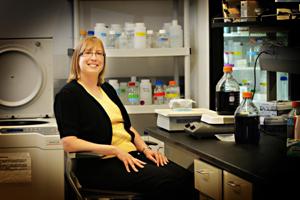Researchers from the University of Utah have designed a fuel cell which is able to operate at room temperature using enzymes to produce electricity from the jet fuel without burning the fuel. This fuel cell has potential applications in sensors, off-grid power and portable electronics.
 Image Credit: Dan Hixson, University of Utah College of Engineering.
Image Credit: Dan Hixson, University of Utah College of Engineering.
A chemical reaction between oxygen-rich air and fuel facilitates the conversion of energy into electricity. The fuel cell can produce clean and cheap electrical energy with a continuous flow of fuel.
Whilst batteries are generally used to power generator and electric cars, fuel cells can be used to supply power to fuel-cell vehicles such as prototype hydrogen-powered cars, and can act as power generators in buildings.
The study carried out at the University of Utah investigated a kerosene-based jet fuel known as Jet Propellant-8 (or JP-8) under extreme operating conditions such as those found at subzero temperatures or in scorching deserts.
In general, it is difficult to extract electrical energy from jet fuel using conventional methods due to the presence of sulfur in jet fuel.
The sulfur content can affect the metal catalysts which play a major role in oxidizing fuel. However using traditional methods, only 30% of the fuel is converted into electricity under extreme conditions.
In order to resolve this issue, the researchers used JP-8 in an enzymatic fuel cell. Enzymes are proteins which can be used to accelerate the chemical reactions. The enzymatic fuel cells are resistant to sulfur and are capable of operating at room conditions.
Two types of enzymes alcohol oxidase and alkane monooxygenase were used to catalyze JP-8 and fuels such as octane and hexane were tested. It was observed that the power generation using an enzymatic fuel cell remained unaffected with the addition of sulfur.
Although previous experiments have demonstrated the use of JP-8 on solid-oxide fuel cells operating at temperatures above 950°F, this work is the first to describe the application of JP-8 at room temperature. This study has been published in the American Chemical Society journal ACS Catalysis.